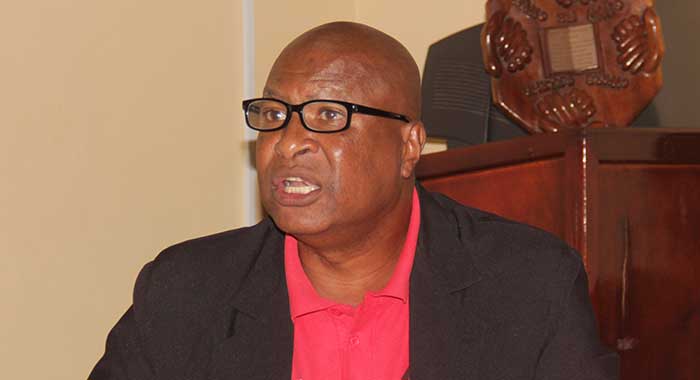Schools in St. Vincent and the Grenadines (SVG) are not ready to reopen amidst the coronavirus pandemic, the Teachers’ Union said on Tuesday — two weeks before the Aug. 31 return of all students to the classroom, since March 2020.
“As it is now, we were on the ground up to yesterday, the Industrial Relations Officer and I, we were visiting schools, and sad to say, unfortunately, things are not what we expect,” president of the SVGTU, Oswald Robinson told a press conference in Kingstown.
“Things are the same. As a matter of fact, schools were supposed to be involved in training of teachers to do the virtual teaching. Some of the venues which were earmarked to do the face-to-face, the hands-on training, they don’t have internet. You could imagine that? Yeah, you don’t have reliable internet.”
He said this is why he had earlier in the press conference called on the telecommunications service providers to do “the honourable thing and make sure we have a better service”.
Fiona Charles, the union’s acting spokesperson, told Tuesday’s press conference that some schools were not cleaned when teachers turned up for Professional Development Week on Monday.
“… the schools are not prepared in that way as yet — some of the schools. So things are not quite ready. Things are not quite where we would have hoped they should have been,” Charles said.
Meanwhile, Robinson said a lot of times, teachers depend on “their moral persuasion or moral obligation and they take on certain tasks”.
He said this is the reason why teachers sometime buy cleaning supplies and take them to the classroom.
“The Education Act is clear on that. Every school must be cleaned on a termly basis,” Robinson said, adding that the law also speaks about a proper janitorial service.
He said the SVGTU had several meetings with the Ministry of Education “way back when the whole COVID situation descended upon all nations”.
Since then, the union has had several meetings with the education ministry and has made several suggestions, “focusing primarily on the new norm, new modes of teaching, virtual teaching.
“As a trade union, we also have a fundamental responsibility to monitor every situation that may affect the working conditions of teachers. And we cannot separate the teaching environment from the learning environment because they go hand-in-hand,” Robinson said.
He said the union has been listening to the voices of teachers and the extent that the government has decided to reopen school for all students, the union is saying there must be reliable access to internet.
“During the period when Grade 6 went to school and to some extent Grade 5, this was one of the sore point,” he said, referring to the period when students from these two grades returned to the classroom after in-person teaching were suspended for all students in March.
“Sad to say, today, there are still schools, which do not have internet accessibility. So I am using this opportunity also to ask the providers to do the honourable thing. If you are providing internet service to educational institution, and you know education is a fundamental human right, then you have an obligation, as a provider of internet service, to ensure that we have reliable internet in our educational institutions,” Robinson said.
The trade unionist said that teachers, and students alike, have to have reliable internet in their homes, if they are going to be called upon to engage in online education.
“If that’s the way we are to go, if this is a digital age, come on, we have to get on board and do the honourable thing,” Robinson said.
He said another issue is compatible devices.
“We cannot continue to rely on teachers who have a little cell phone which may not have the necessary applications, to do a quality service in terms of teaching.
“Teacher cell phones are already overwhelmed; same thing with parents. Here is where the government of St. Vincent and Grenadines must come on board and provide compatible devices to our students and our teachers.”
Robinson said that the union is also calling for training of teachers in online instruction.
“I know the Education Advisory Board met with the Ministry of Education and spoke about training so that our teachers would be equipped with the necessary skills, the knowledge that would also enhance their attitude in terms of using the technology which is available to educate our students.
“It is COVID now but we don’t know what may be next. Let’s say we have a disaster, God forbid. Here is where the technology, again, is required. So we need to get the devices to our teachers. We need to train them to use the platform so that they can execute their work, accordingly,” Robinson said.







This point of argument makes no sense. Why is he talking about online teaching when only face-to-face instruction is the only kind of instruction taking place. There is no blended system. I thought his argument was coming from a different point.
There are multiple deficiencies in the education system. When we are referencing IT our discussion still focuses on connectivity issues. After ten years we are still without reliable internet and we cannot move forward to the critical back end issues of programming, mobile app creation, gaming, e learning, e commerce etc. This is because of a weak ICT policy , enforcement and implementation structure. I have poor, unreliable internet. Reporting to the service provider is a waste of time and the agency with oversight has -no teeth.